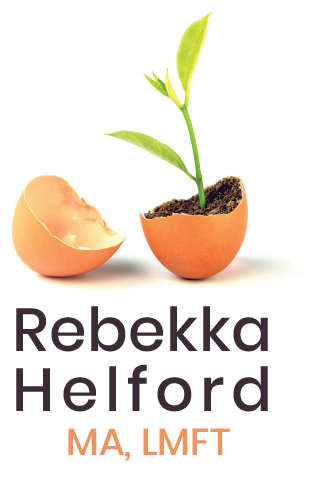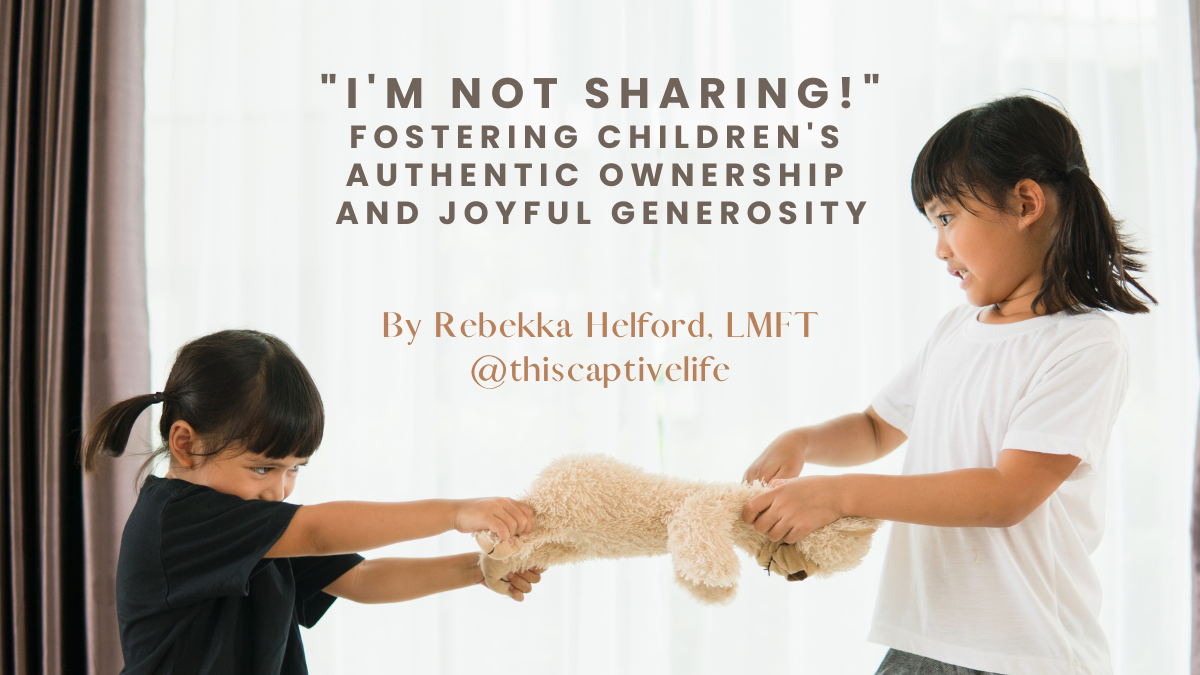"I'm not sharing!" Fostering children's authentic ownership and joyful generosity
"I'm not sharing!" The 2-year-old gleefully proclaimed to me.
Caught off guard, I laughed and shook my head. "You want me to know you're not sharing right now."
"I'm not sharing!" She repeated.
"You're letting me know you're not sharing. That's okay, you don't have to share if don't want to."
This is a common occurrence in many of my parenting classes, one that leaves parents scrambling, horror-struck, to correct their children's improprieties. I understand this shame and alarm, especially coming from the childhood background most of us had: being told repeatedly to share by well-meaning adults, knowing that it meant to give away what was precious to us or face our parents' disapproval. Small children will tolerate the most egregious insults to remain in their parents' good graces, as the fear of being unloved outweighs the allure of just about any toy.
But the truth is, toddlers fundamentally lack the ability to understand the intricate social concept of sharing—and then do it reliably—until they are well on their way to 4 years old. This is a common misconception of parents, one documented by the Zero to Three foundation and termed the "expectation gap" - the gap between what parents expect children to do and what they can actually do.
Think about how complicated sharing is - I imagine the thought process looks something like this:
I have a thing. I really like it and am enjoying using it. This other child is coming over to me—reaching out a hand. Do they want it too? Looks like it. Boy, this thing is making me super happy to play with. But I think it would make this other kid happy too. I imagine I'll be disappointed if I give them the thing, but it would also make them happy, and making them happy would also make me happy. I think I'll choose to sacrifice my desires for the moment and make them happy by giving them the thing, and hopefully the happiness I feel from giving them the thing will outweigh the loss I feel from letting it go.
Is it any wonder, then, that a baby or toddler cannot grasp this concept? Look, I know I've already griped about this in a previous blog post - okay, we get it, you're not teaching your baby to share! So what can we do instead? Glad you asked.
First of all, when children are empowered to use toys for as long as they like, and gently reminded that someone else would like a turn when they are done, eventually they figure it out. They go find the other child and bring the toy to them.
Case in point, take the child in my opening vignette. Not 5 minutes after her adamant declaration that she was not sharing, she spontaneously brought some much-desired baby dolls to a friend, without any adult prompting. So one thing we can do is...absolutely nothing! This is my preferred approach to take when no children are upset with what is happening. As noted by parent educator and RIE founder Magda Gerber, lessons learned for oneself are often learned more powerfully than those imposed by others.
Secondly, we can actively prepare our children for this kind of social dynamic. You see, I stumbled recently upon something amazing: Just as I can foster my daughter's autonomy and assertiveness by empowering her not to share when she does not want to, I can also foster her sense of authentic joy by cultivating opportunities for generosity.
You see, my daughter has lately become obsessed with beads (this is one way I know she is truly my child). Our living room floor is covered with a riot of colorful orbs and a tangle of pipe cleaners. She can sit and "do beads" for hours. I help a little bit by turning her creations into bracelets, punctuated by cryptic messages spelled out in alphabet letters on plastic hearts and cubes.
The other day she had a playdate scheduled. On a whim, I asked her if she might want to bring one of the bracelets to give to her little friend. She thought about it for a moment, then replied enthusiastically, "Yes, I do!" We looked carefully over all the bracelets she had made; she chose one to wear herself and selected a special one to give to her friend. On the way to the playdate, she gabbled excitedly about the two bracelets: one for her, one for her friend. When we arrived, as soon as she saw her friend, she tore off in a run with a huge smile on her face.
"This is for you!" she exclaimed. "Do you want it?"
Her friend took one look at the offering and shouted lustily, "YES!" (Plastic beads and pipe cleaners are clearly the best thing ever for 2-year-olds.) My daughter talked about the incident later, noting that it made her friend happy to get the bracelet. She told us that giving the gift made her happy too. (Cue sound of heart breaking, then melting into a puddle.)
Here are some elements of why I find this to be a successful strategy in cultivating authentic joy in generosity.
My daughter was prepared in advance. Often times "sharing" happens in a drive-by manner, when children are taken by surprise. Because transitions are difficult, children often need a good chunk of time and a lot of planing to feel ready for what's to come.
My daughter had choice. She got to decide whether or not she wanted to give, and then she decided what she wanted to give.
My daughter still had something left for her. She still had something of her own to enjoy, so her generosity did not leave her feeling robbed of everything.
If you'd like to try your hand at cultivating some authentic joy in generosity with your children, here are some ideas for you!
At the park
The park is often a tricky setting for sharing. I recommend preparing children well for trips to the park, starting by leaving any special toys at home for safe keeping. Next, let your child know that other children at the park may want to play with whatever toys you choose to bring. Invite your child to join you in choosing toys that both they and other children will enjoy. Give your child full authority to decide whether to take or leave a toy. As you consider each toy, imagine together how your child and other children might enjoy each one, both playing alone and together. On the way to the park, continue the conversation, engaging in a reverie about how much your friends are going to enjoy what you're bringing to the park that day.
Plan a gift
Tell your child when a parent or friend's birthday is coming up. Invite them to think with you about what that person likes to do, what their favorite color is, or what makes them happy. Brainstorm together what sorts of gifts this person might enjoy. Plan a special trip to the store to select this gift - invite the child to place it in the cart, hand it to the cashier, and carry the bag to the car. Imagine together how much the recipient will enjoy the gift as you drive home. Solicit your child's help in designing some awesome homemade giftwrap (scribbles on construction paper for the win). Invite the child to present the gift to the recipient.
On a playdate at home
Home-based playdates mean you don't have to go anywhere (awesome), but can be threatening to children who are naturally possessive of their things. Prepare your child for the playdate by inviting them to put special toys away in a safe place, then inviting them to think about what toys their friends would like to play with. As with the pre-park-prep, you can take your time considering a variety of toys and giving your child power to make the final cut. As you wait for the friend to arrive, you can imagine together how much fun they will have enjoying your child's toys together.
Make something nice
For a special occasion, or "just because," a handmade token of affection can bring both pride and joy in generosity. Young children who are cultivating a sense of mastery and autonomy like flexing their budding skills as makers and creators. Whether it's beads, origami, drawings, or sticker art that your kid really enjoys, invite them to make something special for a friend or loved one. Support them in making or choosing carefully what they want to give and to whom. Imagine together how much that person will enjoy it. Invite the child to hand it to the recipient personally, letting them know they made it just for them as a special gift.
♥ ♥ ♥ ♥
The season of giving is upon us, for certain, but the spirit of generosity is alive and well year-round. As parents and caregivers, we can help our children as they experience all kinds of feelings, among them the joy that comes from authentic generosity. When we strengthen their hearts and souls, we strengthen our own in turn.
Rebekka Helford is a licensed marriage and family therapist in private practice in Los Angeles, California. With over a decade of experience working with parents and young children, Rebekka specializes in short-term intensive parenting consultation, using a variety of tools including home, office, and school visits to help families navigate developmental hiccups and get back on track. Virtual visits now available!
Click here to schedule an appointment or contact Rebekka with a question – who knows, she might even answer it in her next post!


